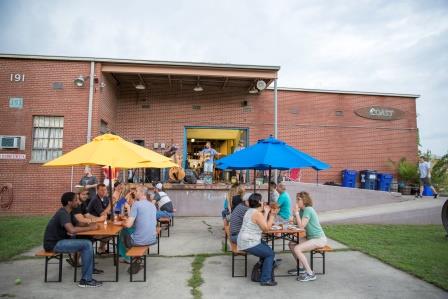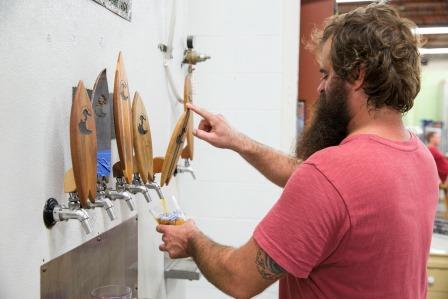How to accommodate breweries and public sipping
Craft brewing in South Carolina is growing rapidly thanks in part to changes made to state law over the last several years and a rising interest among both young professionals and older craft fans. From brewery openings to more festivals featuring craft beer, cities and towns are benefiting from this growth.

Craft beer lovers gather behind COAST Brewing Co. Credit/COAST
The City of North Charleston, for example, is home to six breweries and has four on the way.
Breweries lure young people of all backgrounds, said Jaime Tenny, who founded the South Carolina Brewers Guild and owns COAST Brewing Co. in North Charleston with her husband, David Merritt.
"Craft beer is a draw for them, and they want to live and work near breweries," she said, adding that historically, breweries and pubs have functioned as social hubs.
"They used to be the center of life for a community, and I think you are seeing that grow again. In one word, breweries make a city cool. COAST is a perfect example of a repurposed site, in our case an old Navy base. Cool location, warehouse vibe and space to grow."

David Merritt, owner of COAST, dispenses beer. Credit/COAST
North Charleston Mayor Keith Summey and city staff recognize that craft breweries attract young professionals and the creative class to areas where they otherwise wouldn't venture, said Ryan Johnson, the city's economic development and public relations coordinator. He pointed to Freehouse Brewing, which is located at the rear of Stark Industrial Park, an area that is mostly zoned heavy industrial.
The average Lowcountry resident wouldn't normally think of the industrial park as a place to hang out.
"However, since the brewery is located there, visitors travel through the industrial area and end up at a brewery with a scenic view of the Ashley River," said Johnson.
"I contend that due to folks traveling to our breweries, cumulatively, our breweries are our second largest tourism destination, behind the North Charleston Coliseum."
The power of craft brewing to rejuvenate industrial spaces and zones is easy to recognize. But there's more that municipal officials need to understand about the industry, such as what's allowed under state law and the local ordinances that are needed to ensure cities are prepared to welcome this important, growing industry.
Land use
Land use ordinances play an important role in where craft brewers can locate. Craft brewers are typically low-impact businesses that come in all sizes. They are found in small commercial buildings, like Good Times Brewing in downtown Greenwood or in larger facilities in industrial parks, like Westbrook Brewing in Mount Pleasant. Therefore, a town's comprehensive plan and zoning ordinance need to account for the multiple sizes and scales of craft breweries.
Related to land usage, city officials should be able to differentiate between a brewpub and a brewery that features a tasting room or taproom.
A brewpub brews its own beer, but state law allows the sale and serving of its beer only at its facility. A brewery, however, can brew and then sell its beer to a wholesaler as well as sell and serve limited amounts directly to the public in its taproom. These differences are the result of South Carolina's past and recent history of managing alcohol.
Thanks to recent changes in state law, breweries may sell and serve limited amounts of their product directly to the public. In 2013, the "pint bill" became law, freeing up breweries to serve up to 48 ounces of their product to a customer over a 24-hour stretch. Before, the limit was 16 ounces parceled out in 4-oz. samples.
Depending on which brewing model is proposed, a town's zoning ordinance may prevent the brewery from locating and prospering there.
North Charleston City Council recently amended its zoning ordinance to allow breweries in CRD – Commercial Redevelopment District. Before, breweries were required to operate within M1 – Light Industrial property.
"Understanding that breweries are an attraction, which the consumer prefers to be closer to residential areas, the lowered zoning opens up a huge amount of properties for potential brewery operations," said Johnson.
Since the 1920s, South Carolina has required the use of the three-tier system to manage alcoholic beverage sales. There are exceptions to this system, but otherwise, everyone must follow the three-tier system, including cities that sponsor events where alcohol is served.
Who gets to pour at special events?
Municipal officials should understand who is allowed by law to serve alcohol at special events. State law prohibits brewers from serving their products outside of their own taprooms. Brewers may be present at special events where their beer is served but only to educate the public about their products. Only another licensed entity is allowed to pour craft beer for the public. And that licensed entity must get a special event permit issued by the South Carolina Department of Revenue.
The State Law Enforcement Division is then responsible for enforcing the state's alcohol laws. Some events have been subject to law enforcement action because they didn't follow the special event law or the organizers of the event ran afoul of local ordinances.
Town ordinances typically prohibit the public consumption of alcohol. However, when cities host festivals, organizers and vendors often request a waiver to serve beer or other adult beverages. If the city agrees, the city should have a process for permitting public consumption of alcohol and the specific conditions under which a permit is granted.
Festivals aren't alone in posing potential problems. Zoning and public consumption ordinances also become an issue for restaurants that wish to serve outside their building. Some councils across the state have modified their ordinances to allow restaurants to serve customers on sidewalks and patios outside of their buildings. Those ordinances address issues like intrusion into rights of way, hours of service and safety.
Liability factors
Finally, municipal officials should understand how to mitigate liability associated with alcohol, particularly if a town sponsors an event where alcohol is served or allows others to use town facilities for events featuring alcohol. During city-sponsored events, municipal officials need to consider who will be permitted to serve the alcohol, how to manage access by minors and how to properly educate the servers. If an event is held in a city-owned venue, officials need to make sure the event sponsor is properly insured. If not, the city should consider additional coverage through a Tenant User Liability Insurance Program.
Whether through the opening of a brewery or through a special event, craft brewing in South Carolina is becoming a growing part of local economies. Municipal officials should review their ordinances to prepare for the growing industry and to ensure cities are safe from liability.
